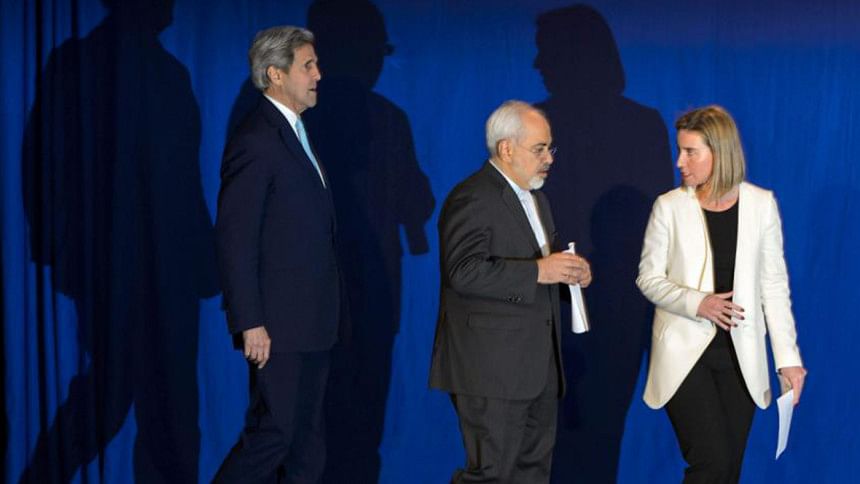World powers in final push for Iran nuclear deal

World powers raced Sunday to clinch a landmark deal to prevent Iran acquiring a nuclear bomb, with a source close to the marathon talks saying an agreement was "98-percent" completed.
The two sides intensified their diplomatic efforts ahead of a new Monday deadline to reach a deal to end a 13-year standoff with the Islamic republic, which is seeking relief from crippling sanctions.
"I think we're getting to some real decisions. So I will say, because we have a few tough things to do, I remain hopeful. Hopeful," US Secretary of State John Kerry told journalists in Vienna.
Kerry, who took time out from the nuclear talks on Sunday morning to attend a Latin Mass at St Stephen's Cathedral, described the latest talks with his Iranian counterpart Mohammad Javad Zarif as "positive".
EU foreign policy chief Federica Mogherini said on Twitter that these were "decisive hours".
As the discussions entered a 16th day, there were glimmers of hope that a breakthrough might finally be in sight after the so-called P5+1 group -- Britain, China, France, Germany, Russia and the United States -- talked deep into the night.
"Ninety-eight percent of the text is finished," said a source close to the discussions, after a flurry of bilateral and multilateral meetings throughout Saturday.
Two or three key questions remained, however, including how long any agreement should last, and over the lifting of international sanctions on Iran such as a UN arms embargo, the source added.
"Now there needs to be a political decision. And if that is taken things could quickly" progress, the source said.
'TIME TO DECIDE'
French Foreign Minister Laurent Fabius -- who left for Paris on Sunday but was due to return later -- said Saturday that the talks were approaching a critical moment.
"Everything is on the table. It's now time to decide," he said.
Three previous deadlines in this round of talks have already been missed.
Under the parameters of a framework deal reached in Lausanne in April, Iran is to slash the number of its centrifuges from more than 19,000 to just over 6,000 and cut its stocks of enriched uranium, which can be used to make a bomb, from more than seven tonnes to about 350 kilos (770 pounds).
The aim is to ensure that it would take Iran at least a year -- from an estimated two to three months now -- to acquire enough fissile material to build a bomb.
Negotiators left the thorniest issues until last, including a mechanism for lifting interlocking EU, US and UN sanctions.
A new hurdle was thrown up in recent days, with the Iranian delegation insisting that a UN arms embargo be lifted once a deal is reached.
The talks have also stumbled over demands to allow UN nuclear inspectors access to military sites, to investigate suspicions Iran sought to develop nuclear weapons in the past.
Tehran denies its nuclear programme has military aims.
A final agreement would be a diplomatic victory for US President Barack Obama, who has made the talks a centrepiece of his foreign policy, and for his Iranian opposite Hassan Rouhani, a moderate seeking to end his country's diplomatic isolation.
Both have faced opposition from hardliners at home, as well as from Iran's arch-foe Israel, believed to be the Middle East's only nuclear-armed state, although it has never confirmed it.
Israeli Prime Minister Benjamin Netanyahu said Sunday that the deal would allow Iran to make "many nuclear bombs and gives it hundreds of billions of dollars for its terrorism and conquest machine, thereby endangering the peace of the entire world".
Saudi Arabia and other Sunni-ruled Gulf Arab states are also deeply suspicious of Shiite Iran, accusing it of fomenting unrest in Syria, Yemen and other flashpoints in the region.
Obama, a Democrat, has faced persistent opposition to his Iran policy from US Congress, which is controlled by Republicans, who by their right of review may try to block an agreement.
After a previous deadline to present a deal to the US Congress by Friday was missed, the review period doubled to a potentially more problematic 60 days.
Iran has for years faced UN, EU and US sanctions that have placed restrictions on the country's oil and banking sectors, trade and everyday life for the 78 million population.
In Tehran, Iran's supreme leader Ayatollah Ali Khamenei said Saturday that the battle against the "arrogance" of the United States would continue.
"The US is perfect instance of Arrogance. Prepare yourselves for more fight against Arrogance," his English-language Twitter account quoted him as saying at a meeting with university students.

 For all latest news, follow The Daily Star's Google News channel.
For all latest news, follow The Daily Star's Google News channel. 



Comments